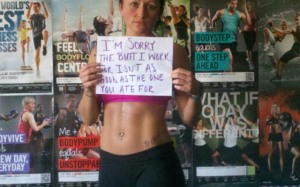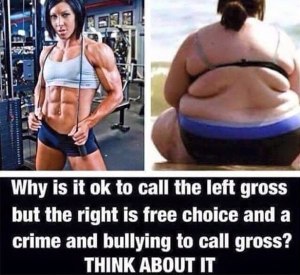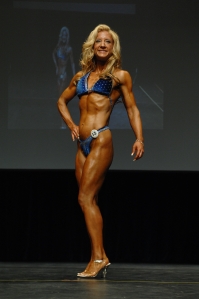
From an article called: “Fit shaming is the new fat shaming: Have you been a victim?” See http://www.fitnflexed.com/article/fit-shaming-rise-have-you-been-victim
I was going to title this post “Is Fit Shaming a Thing?” but someone had already used it. In fact, I found quite a few discussions about “fit shaming” online, dating from 2014 to 2016. In theory, fit shaming is when people who are fit and healthy are criticized for being obsessed and made to feel ashamed of their bodies, based on assumptions about their lifestyle and narcissistic mentality. Some bloggers insist that fit shaming is simply the opposite of fat shaming. They argue that it is discriminatory and wrong to ridicule fit people, just as it is wrong to exclude or make fun of fat people. Others, including the woman who writes at “Iron Beaver Fitness,” provide a more sophisticated view, understanding that being fit is privileged in our society and cannot be shamed in the same way as fatness http://www.ironbeaverfitness.com/articles/2016/7/31/is-fit-shaming-a-thing.She notes along similar lines that white people cannot experience “reverse racism” and men are not subject to “reverse sexism.” I agree with the lady with the iron beaver. Such invented “reverse” categories deny the existence of institutionalized privilege and relations of power; they ignore long histories of discrimination. In short, they are complete bull shit. Thin people are currently privileged in our society, regardless of their level of fitness. And although fit people are not always thin, there really is no such thing as fit shaming.
Displays of strength, agility, speed, and flexibility tend to be met with praise, notably in our hero worship of professional and (sometimes) amateur athletes. I have never witnessed or been subject to fit shaming. I have never had anyone yell “gross” when I am pushing a loaded sled across the gym floor or doing a tabata workout with my new gym partner, she who has yet to be nicknamed [Update: Henceforth she shall be called “Dr. Ironcore,” or DI]. My chest presses might surprise the young men in the weight training area, but I doubt they think that I am disgusting. I doubt they think about me at all. The display of fitness has little to do with appearance and everything to do with physical performance, including a wide range of activities like ballet dancing and wheelchair basketball. I realize that female shot putt athletes and gymnasts were ridiculed as fat at the 2016 summer Olympics, but those were grotesque cases of misogyny and racism, not fit shaming. Most people admire the kind of dedication and ability exhibited by fit people in action—ideally fit male people—heaping praise upon them.

An anti-muscle shaming meme that fat shames. See http://www.fitnessandpower.com/fitness-stories/muscle-shaming
In contrast, the display of visible musculature is openly and easily subject to criticism, especially when those muscles are grown by women. This is a bit confusing because sometimes muscularity is conflated with fitness. This slippage between muscularity and fitness is understandable because visibly muscular people are usually quite fit, depending on how fitness is defined. Sometimes people can be strong and ripped while lacking flexibility, cardiovascular capability, agility, or hand-eye coordination. For the most part, however, visibly muscular people have the whole package and can be seen jumping up on high benches and running stairs before hitting their personal best max dead lift. While I openly applaud these people—I will give a nerdy thumbs-up to ripped women doing Turkish Get Ups at the gym—others find them horrifying. The critics do not cast shame on the fitness levels of these individuals; they condemn their bulging biceps and six-pack abs. Back in the day, I was shamed for having a visibly muscular upper body. Young women at the gym would say “Ugh I would never want to look like that,” quite loudly in my presence but it was much worse in public places. The photos of me on stage during my figure competition were savagely attacked by internet trolls in 2011, just the tip of the iceberg compared to what women who are far more muscular than me face every day. Many friends of mine with what I consider to be beautifully muscled and vascular arms are openly derided as disgusting, told that they are unfeminine, and warned that men won’t find them attractive (as if that was the ultimate goal of female existence). Although women are particularly subject to this kind of sexist discrimination, I suspect that extremely muscular men also hear negative comments and experience body shaming. At the very least, they are accused of using steroids, based on the false assumption that muscles will rapidly grow on their own after taking supplements. All the same, none of these cases constitute fit shaming. These efforts to shame others are based on the perception of excessive muscularity, not excessive fitness.
Why do muscular bodies invoke this kind of reaction? I have a few suggestions. For one thing, it is practically impossible to be visibly muscular by accident. Sure there might be some shredded farmer somewhere, who simply gained muscle mass through plowing the fields and lifting bales of hay, but I doubt it. Growing large, balanced, and proportionate muscles takes dedicated and consistent hard work and knowledge, coupled with an interest in proper nutrition. Diet is essential to visible muscularity. Trust me, I know. I lift heavy and work out six days a week, but I now overeat and my absolutely massive muscles—ha ha—are covered in fat. No one gives me a hard time about my appearance anymore, though I am technically just as muscular as I was before. As far as I can tell being fit is fine and being muscular is fine. But displaying deliberately grown muscles like a big feeling prick is not fine, especially at a Planet Fitness gym. Why should this be the case?

Maria Kang responds to her critics. See “Is fit-shaming just jealousy?’ http://www.stuff.co.nz/life-style/well-good/9965817/Is-fit-shaming-just-jealousy
While visibly muscular people, especially women, are regularly accused of narcissism, this is not really the problem. Women are encouraged to care about their appearance and to spend time “improving” it with make-up and hair care products. Women who refuse to conform to standards of attractiveness will be punished in numerous overt and subtle ways as they go about their everyday lives. The issue lies elsewhere. In my opinion, the visibly muscular body is objectified and subject to stereotyping. Some audiences view muscular people as things, assuming that muscular bodies convey clear messages, usually messages aimed at them. From this point of view, visibly muscular bodies insult others, telling presumably unfit and unmuscular people that they are fat, worthless, and lacking in self-discipline. Now this kind of misreading of the muscular body is understandable, given the media portrayal of Jillian Michaels, Maria Kang, and that horrible model who photographed a larger woman showering at the gym. Those muscular women did insult and fat-shame others. It does not follow, however, that all visibly muscular bodies send the same negative message, nor any message at all. You know those muscly fit dudes in the weight lifting area? Those bros wearing skimpy tank tops and backwards ball caps? What do they think of people with soft flabby arms at the gym? Probably nothing at all. Those guys are serious about working out and do not care who else is there or what they look like as long as they follow gym etiquette by not crowding them or standing in front of the mirror or leaving weights lying around on the floor or smelling really bad. It is the same for those gorgeous women who wear tiny bras and have giant “she squats” butts. Those ladies do not give a shit about you or me. They do not give a rat’s ass about anyone with less muscle than them. They have goals and plans and probably a complicated life. Their appearance is not in and of itself oppressive to anyone.
This rambling discussion brings me to the issue of dress codes at the gym, especially those that require people to cover up their midriffs and shoulders. I call bull shit on them. Such rules are discriminatory and should be illegal. Muscular shoulders do not send a message to fat people. Six pack abs do not infringe on the rights of anyone else. People who feel uncomfortable around such muscular bodies need to reconsider the source of their discomfort, potentially locating it in dominant cultural norms rather than individuals. There are many legitimate reasons for fat or unfit people to take issue with the fitness industry—and here I am referring to the commercialized nonsense you see online and on TV, not actual fitness professionals who are well educated and regularly work with a diverse range of clients. But the best way to feel comfortable at the gym is to engage with such fitness professionals and learn how to work out. As a middle-aged, no-longer-visibly-muscular woman I feel completely at ease in any gym, with any number of hot men and women around me. I now work out regularly at the gym on campus, and I am almost always the oldest and least attractive person there. I am nevertheless comfortable because I know how to train and use all of the equipment, without annoying those around me. I would not feel better or fitter if all undergraduates were forced to wear baggy t-shirts.


Super ripped 🙂
“Some audiences…[assume] that muscular bodies convey clear messages, usually messages aimed at them…Muscular shoulders do not send a message to fat people. Six pack abs do not infringe on the rights of anyone else. People who feel uncomfortable around such muscular bodies need to reconsider the source of their discomfort, potentially locating it in dominant cultural norms rather than individuals.”
This post is so spot on! People “fit shame” because of their own insecurities and what they imagine fit people think about them (and the messages their bodies are supposedly conveying). As you so rightly pointed out, those visibly muscular people are probably not thinking anything about anyone else at all, let alone trying to express some kind of message by merely existing in their bodies.
You know, you’re absolutely right. When I’m at the gym, I couldn’t care less about who else are there and what they’re doing. I focus solely on my exercise.
I don’t condone bullying fat people but I sure as hell get pissed off when they project their body image issues onto other people and shame them.
This article is great and hits the target directly in the Bull’s Eye. I work out no less than 5 days a week, eat right, and pride myself on my strong and powerful physique that I have worked very hard to achieve. When I am at the gym, I barely even notice who is around me, let alone make any judgements. Sometimes people i know will tell me they saw me at the gym, but i am in my own world during my workout and didnt even notice the familiar face. Im there for MYSELF, and am focused 100% on my own workout and my own body. Who is there, what they are doing, how much they are lifting, how many reps they’ve done, or the shape of their body goes totally unnoticed.
That being said, I have my own theory on this topic that I would like to share…Sometimes it is very difficult for some people to take an honest look at themselves. I think about my own experience when I first began going to the gym years ago. I was very soft, flabby, weak, and one box of Hunny Buns away from 300 pounds. Walking into Golds Gym for the first time, and seeing all of the fit and muscular people working out there was not only intimidating, it was also disheartening. I was incredibly weak and out of shape. It was beyond embarrassing for me, as a man, to load a 10 pound and a 5 pound plate on each end of the bar, for a total of 75 pounds, to do bench presses…while the WOMAN at the bench next to me was pushing 155 pounds, more than twice the weight I was, with no problem at all. It was extremely hard for me to know and accept that I was that weak and out of shape. I would look at every hard-body there and feel like everyone was judging me and making fun of me in their heads. I felt absolutely pathetic. I saw how hard they worked, and how motivated and focused they were, and I imagined that the amount of hard work and dedication that they put in to build that kind of muscle and attain that level of fitness, was something that a soft and weak guy like me could never muster. There are no words to express how hopelessly disheartening that felt to me at the time. In those moments the only thing I wanted to do was quit. To run out of there, hide out at home, and eat my feelings while playing video games. And in a very unhealthy way of thinking, I felt very bitter towards those hard bodied, hard working, muscular people..even tho I knew deep down that my poor physical condition had absolutely nothing to do with them, and everything to do with me and my own lifestyle. I was in the terrible shape I was in because of my own lifestyle choices, and THAT was at the very core of that disheartening and sickening feeling I felt, as well as the resentment and bitterness that arose when I looked at all the hard bodies at the gym. THAT was what i hated the most. And THAT is where I believe the “fit shaming” (for lack of a better term) stems from. When a person goes to the gym to begin their journey thru the world of hard bodies and physical fitness, that person, just as I was, is forced to take a very personal and very HONEST assessment of him or herself. And that is not always the easiest thing for some people. I know it was not easy at all for me. I took my honest assessment, and did not like at all what I was forced to see and accept. In the gym you are laid bare in front of yourself..and whoever else may be around..whether they notice you or not. All of your flaws and imperfections and physical defects are hung out in the open for all to see. If you are soft and flabby, it shows. If you are weak, it shows. If you lack commitment and discipline, that also shows. And if you lack motivation, determination, or you are a quitter, it will show. The iron will expose you for who you really truly are…and in a lot of ways it goes much deeper, and exposes much more than just physical imperfections and level of physical fitness. The iron is honesty in its most brutal form. It will show you a sometimes very painful reality that you may not like or want to accept, and make you ask yourself some very hard questions that you may not like the answers to.
And that, I believe, is the root of what scares some people away from the gym, and sparks the resentment and bitterness that leads to “fit shaming”.
Maria Kang didn’t shame anyone! I still don’t get why some people think that.
I would agree with you if her poster did not have a caption, or had a caption that said “Look at Me” or “I am Super Fit.” But the text on Maria Kang’s poster asks “What is Your Excuse?” It is addressed to a specific kind of viewer: someone who does not look like her. She questions women who are not as fit as her and don’t have children, as well as women who are not as fit as her and do have children. Maria Kang is a gorgeous and fit career woman who has been pregnant three times and has three children. She still has a flat belly and finds time to work out. What’s Your Excuse? if you do not achieve that same level of appearance and fitness? So yes, the caption is meant to shame some viewers and many women reasonably do not like being targeted and questioned by a stranger. Clearly, you do not take up the position of the person being questioned by Maria Kang, for whatever reason. But not everyone is the same as you. And not everyone is the same as Maria Kang. I am not offended by the poster because I don’t give a rat’s ass about what strangers think of me, but quite a few women are tired of being judged and criticized by people who don’t know anything about them or the realities of their lives. And they are right to be tired of such treatment.
Well, i did not see it like that I can see your point tho, but I can’t say “Ah I get it 100%” You are right saying I don’t take that position of being questioned by her or anyone, but that’s how I go about on life mostly, hmm I have now a different point of view to take in consideration for this, thank you for your time to reply to my comment.
I worked in a financial institution as a consultant for two years. My contract was terminated shortly after a team building sport event that highlighted my muscular body as I was wearing a T-shirt. All of a sudden, people forgot who I was and the fact I had a brain. Fit shaming is a thing. I try to wear a suit at all times.
I loved your article! I’m a 21 year old jewish male and I absolutly love, admire and respect beautiful, muscular and confident woman. Most of the nicest, most charming women are those that are dedicated to their healthy- athletic (strong) looking bodies; hence benevolent in all other walks of life. Women are to be treated with dignity and respect for their persistence in the face of damn obstacles. Indeed, men can be pest. I know it too well.